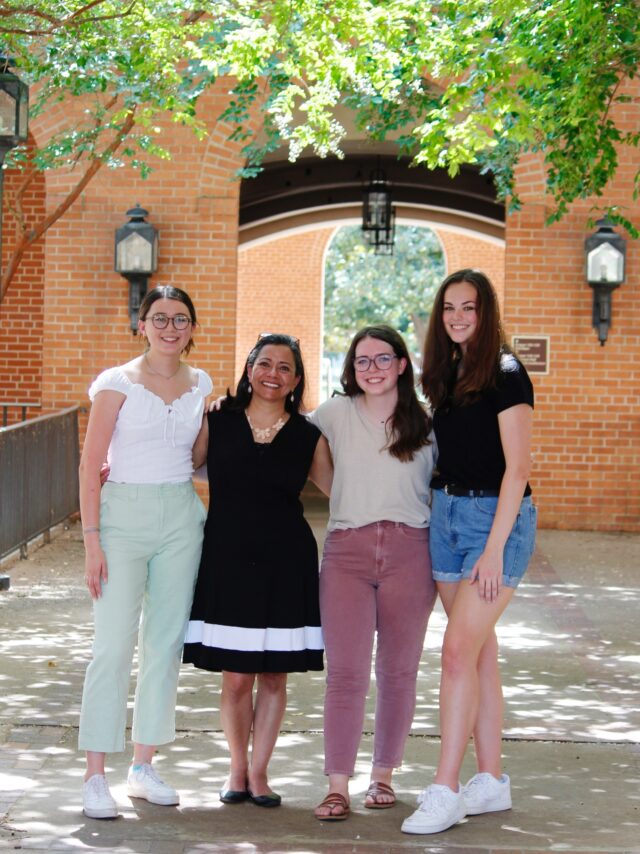By Josh Siatkowski | Staff Writer
Dr. Rizalia Klausmeyer, senior lecturer in Baylor’s chemistry department, never planned to become a professor. Now she’s in her 24th year at Baylor, serving the campus community in a myriad of different ways.
Klausmeyer arrived at Baylor in 2000, and she now balances teaching with her other roles, like director and co-founder of Science Research Fellows, director of undergraduate research and chair of Baylor’s branch of Women in Science and Engineering.
Dover, N.H., junior James Lotter is a Science Research Fellow and has known Klausmeyer since he came to Baylor in fall 2021. Lotter said he and his peers often call Klausmeyer the “cool aunt” of the university.
“She’s very charismatic,” Lotter said. “She makes you feel very comfortable. It can be very daunting as a freshman. … But when you’re around her, you can tell she knows her stuff, and you know it’s going to be OK.”
Lotter also said Klausmeyer has a strong will that has been helpful when advocating for students.
“She has a strong character and doesn’t deviate,” Lotter said. “You know she’s going to get it done.”
Although her personality is suited nicely for helping students navigate stressful professions in the sciences, teaching wasn’t in Klausmeyer’s original plan.
Klausmeyer was born in Puerto Rico and grew up on the dairy farm that her father managed. Although her mother was a school principal, Klausmeyer said she was never encouraged to go into teaching.
“Even though [my mother] loved teaching, she said, ‘Don’t go into teaching,’” Klausmeyer said. “You know how parents are. They want their kids to be doctors, lawyers or engineers. Those are the top three.”
Following her parents’ hopes for her, Klausmeyer enrolled at the University of Puerto Rico, Rio Piedras, as a pre-medicine student. However, after an unsettling anatomy lab in which she and her classmates had to dissect an abnormally large cat, Klausmeyer learned she had no interest in medicine.
“That thing was apparently a well-fed cat because it was massive,” Klausmeyer said, laughing. “[The lab] is forever in my mind as the grossest experience ever.”
Deciding to nurture her love of science while avoiding any more dissections, Klausmeyer switched to an organic chemistry major with the intention of working for a chemical company in Puerto Rico after she got her degree. However, at the advice of a graduate student mentor, she applied for a Ph.D. program in organic chemistry, ending up at Texas A&M.
Though she was still expecting to return to Puerto Rico after her Ph.D. was completed, Klausmeyer’s trajectory changed while at Texas A&M.
“At Texas A&M, I met my husband, Dr. Kevin Klausmeyer,” Klausmeyer said. “And he wanted to be a professor, … and I knew that if he wanted to be a professor, we had to go wherever a position opened.”
Her husband took a brief role at the University of Illinois, so Klausmeyer applied to teach there too, even though the idea of becoming a professor “had never crossed [her] mind.”
Though a new one, the experience went quite well.
“Apparently, I did not know this at all, I had a knack for teaching,” Klausmeyer said. “And I loved it.”
Her husband, however, left just a few years after starting at Illinois, accepting an offer to teach at Baylor. This transition, along with the birth of their first daughter, seemed to be closing the door on a career in teaching.
“I was supposed to be a stay-at-home mom,” Klausmeyer said.
Klausmeyer was a stay-at-home mom for about a month. The Klausmeyers moved to Waco in August 2000, and by September, a sick professor’s leave had already opened a spot in Baylor’s chemistry department. Her husband suggested that she fill the role temporarily, to which the administration agreed.
“[The sick professor] never came back, and I am still here waiting here for her,” Klausmeyer said.
Klausmeyer did far more than simply wait, addressing needs whenever they came up. In 2013, feeling isolated after moving her office to Earle Hall, Klausmeyer founded a chapter of Women in Science and Engineering.
“I wanted the women in the building to be connected, because sometimes you just need someone to talk to,” Klausmeyer said.
In 2017, Klausmeyer helped found Science Research Fellows — a major that allows undergraduate students to participate in scientific research. Part of the exigence for the program, Klausmeyer said, came from her own experience.
“You can’t just knock on doors until someone accepts you. Why? Because I did that. It doesn’t work.”
Ultimately, Klausmeyer said she does it all for her students.
“I’m here to defend the students and protect the students. I will do anything for my students.”



